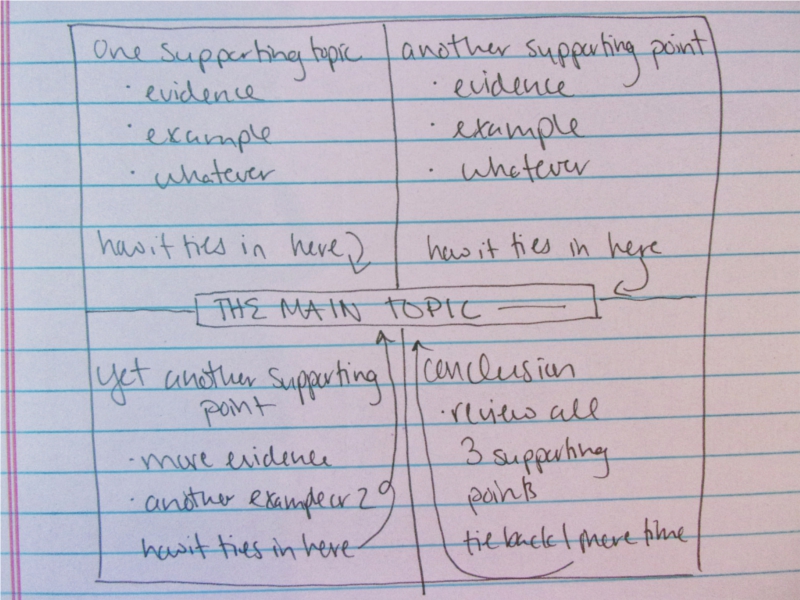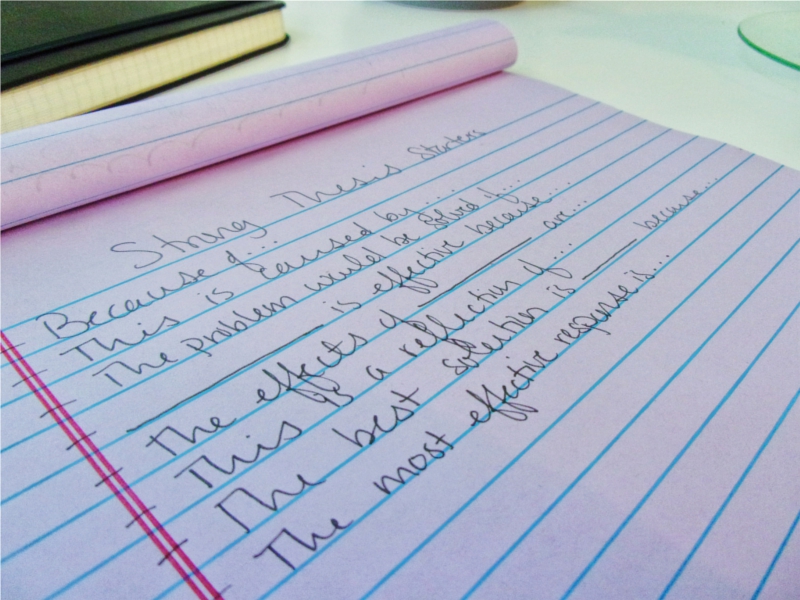Possibly the most difficult part of writing a paper is coming up with a solid thesis. Without it, you paper is based off a weak idea, and even if you produced the most beautiful, eloquent prose ever written, it’s not making much of a point. It’s all too easy to be paralyzed with indecision, and spend more time wondering “What should I write about?” than you would just writing the paper. There are four main traits of a good paper topic, and keeping them in mind will help you write a better thesis.
How to Write a Better Thesis
I have a mild obsession with planning essays on purple legal pads. They help me think my best. Get what you need to do your best thinking – and maybe consult my post on writing a college paper for some general tips – before thinking about your thesis. The obvious starting point is your prompt or rubric. Think about the question your paper needs to answer or stance it needs to take, and brainstorm some ideas on your position. This is so unique to your paper that I can’t tell you how to do it, exactly, but the basic first step of writing a thesis or essay is having something to say. So find your voice. Once you know where you stand and what you want to write about, you’re ready to craft your thesis.
A good thesis should do four things:
- Take a stance
- Preview the paper’s argument
- Aim for brevity
- Be definitive
So let’s tackle them one at a time.
Take a Stance
The point of a real thesis is not to point out that there is a conflict, or that there are multiple solutions. The point of a real thesis is to choose a side of an issue, a method for problem solving, or a perspective for interpretation and prove that stance’s validity. Use your introduction to show your reader that there are multiple methods or viewpoints, if needed. And then use your thesis to stake out a position in that controversy and inform your reader what you’ll be arguing for.
I have seen – and sadly, written – many papers with the thesis “There are two sides to this issue, both have merits, and this paper will explore the merits of both and conclude that they both have strengths and witnesses, because I, the author, am too afraid of commitment to actually take a stance.” Maybe not in so many words, but that’s the gist of them. Unless this is your PhD thesis, it’s just a paper, not a manifesto for the rest of your life. So choose a side of the issue you know you can argue for, and make that clear in your thesis.
Preview Your Argument
But I don’t mean in the terrible four square way. Did anyone else have to do four square writing as a kid? It was the bane of my elementary school existence, it looked like this:
And basically you had to put your main topic in the middle – for example, “social media” – and then in the squares around it, write a reason for or against it with some examples or evidence. Then the last square relisted your three reasons and added why they were important. Then, you used the foursquare to write your paper’s thesis, and it read like this:
“I think social media is good because it connects you to family, makes you read and write, and lets you read the news.”
Don’t think of your grown-up thesis the same way. Instead of using your thesis as a list of your arguments, you should consider it a one sentence summary of your paper’s argument. Something like:
“Social media helps society by reinforcing positive connections and behaviors in users’ leisure time.”
Isn’t that a better thesis? Your readers now know that they’re looking for connections and behaviors that are supposed to be good, without you having to list “family connections, reading, and news” already. Also, it sounds less like a third grader wrote it, but I did that on purpose. For contrast.
Aim for Brevity
I know, I know, it’s me telling people to say fewer words, which is hypocritical. But hear me out. So many people try to do the two sentence thesis, but it’s almost never necessary. A good way to test this is to write a full intro paragraph with your two-sentence thesis embedded in. Then, without telling them it’s two sentences, ask a friend who’s not familiar with the topic to read it and pull out the thesis. If they only choose one sentence, your other sentence isn’t needed – work any essential points into the one they chose and move forward.
I say this not because I’m a crazy lady who hates two-sentence theses, but because readers – including whoever’s grading you – are looking for a one-sentence thesis to tell them what to expect in the paper. Anything not included in the sentence they think is the thesis will seem out of place later in the paper.
Be Definitive
The word “might” should never appear in your thesis. Be direct and clear about the point you want to make, and don’t hedge or soften your statement. If you don’t feel strongly enough about your argument to put it in a declarative sentence, you should choose another paper topic. Aim for strong language that makes your support for your thesis entirely clear. Whether you’re establishing cause and effect, advocating for a solution, or interpreting something, you need to be your argument’s number one fan, and that relies on you using clear and definitive language.
But there’s one more thing a thesis must be…
And that’s flexible. The thesis you write during your outline, and refer back to during the essay-writing process, should support your ideas as you write them. But it’s also the main argument of a paper you haven’t finished yet, so your thesis isn’t finished until your paper is. We all have those moments where we’re writing something and have a stroke of sudden genius – the best idea in the world – and it changes the rest of our paper. That should should change your thesis, too.
A thesis is an argument, a claim, yeah, but it’s the reflection and distillation of every word you write after it, so your final editing process might mean changing your thesis a little – and that’s okay.
Of course, once you’ve adjusted your thesis, you’ll want to proofread your paper one more time to make sure everything still looks good. Fine-tuning your thesis is a great way to finish your paper-writing process and be sure you’ve covered all your bases and fulfilled your prompt’s requirements. What’s the hardest part of a thesis for you? How often does your thesis change while you write?





